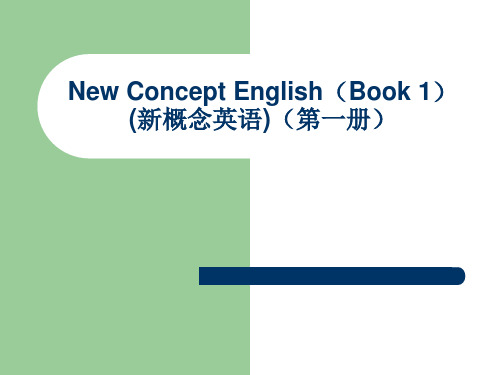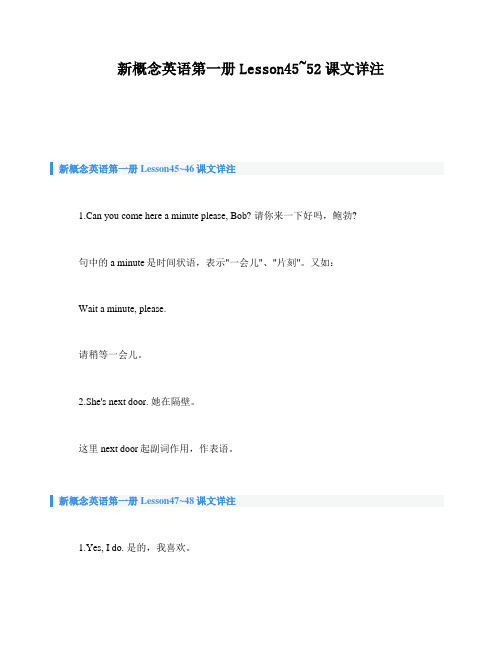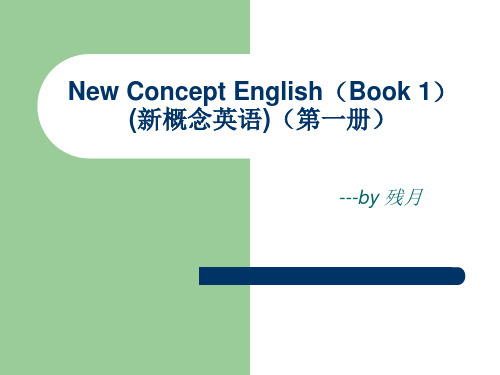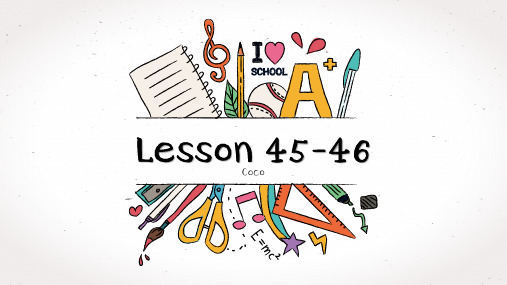新概念英语第一册第45课Lesson45课文单词知识点
新概念一第45-48笔记

新概念一第45-48笔记第一篇:新概念一第45-48笔记新概念一第45-46课重点和难点:情态动词(2)vocabulary1.boss n.老板,工头,上司vt.当……的头;指挥,支使boss about把…..差来差去,对……发号施令2.minute n.分钟/备忘录,记录(at)any minute马上,随时every minute时时刻刻地,迫不及待地in a minute立刻minute hand(钟表的)分针,长针(时针为hour hand, 秒针为second hand)ten minutes to seven差10分7点2.lift n.抬起,提升/电梯go by lift乘电梯上去a lift in one’s career事业的进展lift one’s head抬起头lift up one’s ears竖起耳朵听4.cake n.蛋糕,糕饼或蛋糕a cake of soap一块肥皂a cake of mud一块泥土an ice cake冰块a potato cake土豆饼5.biscuit n.饼干/软烤小圆饼take the biscuit中头奖;出人意料的好(或坏)Key structures:1.Can you come here a minute please, Bob?请你过来一下好吗?PS: a minute 一会儿,不能译成“一分钟”,在句中作状语,相当于:Can you come here for a while please, Bob?2.She’s next door.她在隔壁。
Next door起副作用,作表语,意为隔壁。
3.The boss’s handwriting is terrible!Boss’s是名词所有格,主义其读音。
类似如:Tom’s shoes(汤姆的鞋),Xiao Wang’s company(小王的公司)。
Handwriting书写,是一个抽象名词,只能当作单数使用。
新概念英语第一册第45-46课

★ handwriting 书写 hand(手)+ writing(写) 拓展:calligraphy [kə’liɡrəfi] 书法 very clear handwriting 非常清晰的字迹
tomorrow? 3. 他们会说法语。 They can speak French. 4. 我能够做到。I can do that. 5. 我现在可以回家了吗? Can I go home now? 6. 他不能回答老师的问题。He couldn’t answer
the teacher’s question.
★ boss n. 老板,上司 boss’s 老板的
He is my boss.他是我的老板。
You are the boss! 扩展:boss+y= bossy <非正>好发号施令的,
专横的
She is so bossy!
she is stingy[’stɪndʒi:] , narrow- minded and bossy. 她小气,心胸狭窄,又拔扈。
(2)可怕的 She is a terrible woman. terrible weather 糟糕的天气 terrible traffic 糟糕的交通 terrible accident 严重的事故 adj. 极度的;非常严重的 I’ve got a terrible headache. adj. 糟透的(口语);很蹩脚的 She is terrible at maths. 她的数学很蹩脚。 He is good at maths. 他擅长数学。
新概念英语第一册L45

Is the boss’s handwriting terrible?
What … like?
What’s the boss’s handwriting like?
See you!
Can Bob go into the boss’s office?
Where…?
Where can Bob go?
ask me if
Ask me if Pamela is next door?
Is Pamela next door?
Where…?
Where is Pamela?
ask me if
Lesson 45 The boss’s letter
can
The girl can ride a bike.
He can’t see.
boss
minute
hour second
ask
?
hanwords
• • • • • • can[kæ n] 能够 boss[bɔs] 老板 minute[`minit] 分钟 ask[ɑ:sk] 请求,要求 handwriting[`hæ ndraitiŋ] 书写 terrible[`terəbl] 糟糕的
Unit 23
Can you come here a minute please, Bob?
Yes, sir?
Can you come here a minute please, Bob?
Yes, sir?
New words
can 能够
Can you make the tea? Can you be my girlfriend? 过去式could, 表请求时,语气更委婉些
新概念英语第一册Lesson45_52课文详注

新概念英语第一册Lesson45~52课文详注新概念英语第一册Lesson45~46课文详注1.Can you come here a minute please, Bob? 请你来一下好吗,鲍勃?句中的 a minute是时间状语,表示"一会儿"、"片刻"。
又如:Wait a minute, please.请稍等一会儿。
2.She's next door. 她在隔壁。
这里 next door起副词作用,作表语。
新概念英语第一册Lesson47~48课文详注1.Yes, I do. 是的,我喜欢。
是一句肯定的简略回答。
如果是否定的回答,则应为No, I don't. I like…和 I don't like…这两个句型是分别表示"我喜欢/想要……"和"我不喜欢/想要……"的惯常用法。
2.black coffee, 不加牛奶或咖啡伴侣的清咖啡。
加牛奶的咖啡叫 white coffee. black在有些搭配中不译为黑色的,如:black tea 红茶3.序数词 1st~12th1st----first 2nd----second 3rd----third4th----fourth 5th----fifth 6th----sixth7th----seventh 8th----eighth 9th----ninth10th----tenth 11th----eleventh 12th----twelfth英语中序数词必须与定冠词(the)连用。
虽然有时不在形式上表现出来,在朗读的时候也必须加上the。
如:the 1st month (第1个月),the twelfth century(12世纪)。
新概念英语第一册Lesson49~50课文详注1.What about some steak? 来点牛排吗?句中What可以换成How,用来征求对方看法或意见。
新概念一第45课

★terrible adj. 糟糕的,可怕的
(1)糟糕的 1)-How are you today? -Terrible! 2)-How do you like the movie? 你觉得那部电影如何?
-It’s terrible! How do you like + sth 你觉得…如何?
(2)可怕的 She is a terrible woman. terrible weather 糟糕的天气 She is terrible at maths. 她的数学很蹩脚。 He is good at maths. 他擅长数学。
老板的书写太糟糕了! 名词 n. 1.书写;手写 2.笔迹;笔法
Is that signature in your handwriting? 那个签名是你的笔迹吗? 3.【古】手抄文件,手稿 sign
neat homework; neat handwriting. 整洁的家庭作业;工整的书法。
Yes? What's the matter?
PAMELA: I can't type this letter.
I can't read it!
The boss's handwriting is terrible!
Listen to the tape, and then answer the questions.
be nice to sb. 对某人很好 Our boss is nice to us. 我们老板对我们很好。
Your boss is your boss just because he (she ) has a larger vocabulary than you have .
新概念英语第一册第45-46课The boss's letter

新概念英语第一册第45-46课:The boss's letterLesson 45 The boss's letter老板的信Listen to the tape then answer this question. Why can't Pamela type the letter?听录音,然后回答问题。
帕梅拉为什么无法打信?THE BOSS: Can you come here a minute please, Bob?老板:请你来一下好吗?鲍勃?BOB: Yes, sir?鲍勃: 什么事,先生?THE BOSS: Where's Pamela?老板:帕梅拉在哪儿?BOB: She's next door.She's in her office, sir.鲍勃: 她在隔壁,在她的办公室里,先生。
THE BOSS: Can she type this letter for me?Ask her please.老板:她能为我打一下这封信吗?请问她。
BOB: Yes, sir.鲍勃: 好的,先生。
BOB: Can you type this letter for the boss please, Pamela? 鲍勃: 请你把这封信给老板打一下可以吗,帕梅拉?PAMELA: Yes, of course I can.帕梅拉:可以,当然可以。
BOB: Here you are.鲍勃: 给你这信。
PAMELA: Thank you, Bob.帕梅拉:谢谢你,鲍勃。
PAMELA: Bob!帕梅拉:鲍勃!BOB: Yes?What's the matter.鲍勃: 怎么了?怎么回事?PAMELA: I can't type this letter.帕梅拉:我打不了这封信。
PAMELA: I can't read it!帕梅拉:我看不懂这封信,The boss's handwriting isterrible!老板的书写太糟糕了!New Word and expressions生词和短语canmodal verb 能够bossn. 老板,上司minuten. 分(钟)askv. 请求,要求handwritingn. 书写terribleadj. 糟糕的,可怕的Notes on the text课文注释1 Can you come here a minute please, Bob?句中的can是情态动词,表示“能力”。
新概念Lesson 45-46(第二课时)

lift the table 举起桌子 lift the chair 搬起凳子
他能举起桌子吗? Can he lift the table?
No,he can’t. He can’t lift the table, but he can lift the chair.
★ lift v. 拿起,搬起,举起 lift sth. 举起···
可以指心情,天气,相貌, 味道等 1. 糟糕的 How are you today? Terrible!
My handwriting is terrible.
Wang Xizhi’s handwriting is good. 25
★ terrible /`terəbl/ adj.糟糕的,可怕的
2. 可怕的 My sister is a terrible woman.
children’s day
(2)若名词有复数词尾又是s, 只加“ ’ ”。
the students’ teacher
the workers’ boss
(3)复合名词,“’s”加在最后。
my mother-in-law’s home 我岳母/婆婆的家
扩展:boss+y = bossy 专横的;蛮不讲理的
概念: 一般用来表示人或物经常性或习惯性的动作或状态。
一般现在时
用法 1 表示习惯性、经常性、反复的动作或存在的状态,常与 always,often,sometimes, every day等频率副词或时间状 语连用
他们让我不要看电视。 They ask me not to watch TV.
22
★ ask /ɑ:sk/ 询问,请求,要求
ask for sth 请求,要求某样东西
新概念英语第一册45-46

can的句型结构
1. 疑问句
can+主语+动词原形~? 你会说英语吗? Can you speak English ? 你会煮晚饭? Can you cook dinner ?
我会发邮件。 2. 我会飞。 3. 她不会做作业。 4. 我们不会用电脑。 1. I can send e-mails.
③ 表示允许;许可
你可以走了。 You can go. 你可以进来. You can come in.
can的句型结构
肯定句
主语+can+动词原形~. 我会说英语。 I can speak English. 我会煮晚饭。 I can cook dinner.
can的句型结构
否定句
主语+can+not+动词原形~. 我不会说英语。 I can not speak English. 我不会煮晚饭。 I can not cook dinner.
Must (情态动词)必须
eg: He must shave today .他今天必须刮 胡子。
---Must we clean the room? ---Yes, you must /No, you needn’t. 注意:mt,则表示决不可以,绝对禁止做某 事。 例如:You mustn’t climb the tree.你绝对不可 以怕这棵树
Lesson 45 The boss’s letter
New words
can 能够 Can you make the tea? Can you be my girlfriend? 过去式could, 表请求时,语气更委婉些 Could you help me, please? Could you come over? 你能吃辣吗? 可以载我一程吗?
- 1、下载文档前请自行甄别文档内容的完整性,平台不提供额外的编辑、内容补充、找答案等附加服务。
- 2、"仅部分预览"的文档,不可在线预览部分如存在完整性等问题,可反馈申请退款(可完整预览的文档不适用该条件!)。
- 3、如文档侵犯您的权益,请联系客服反馈,我们会尽快为您处理(人工客服工作时间:9:00-18:30)。
【知识点讲解】
今天我们来简单了解一下情态动词这个语法点。
英语中有一类动词,它们本身带有一定的词义,但是不可以单独作为谓语使用,要和其他动词的原型配合起来构成谓语。
这类动词就叫情态动词。
情态动词的数量很少,主要有:
can (could), may (might), must, need, ought to, dare (dared), shall (should), will (would) .
在这里,我们只学习第一个 Can.
can 可以表示主语的能力。
比如:I can play piano. 我能弹钢琴 / 我会弹钢琴。
也可以表示请求和许可,比如文中的 Can she type this letter for me? 询问的不是她会不会打字,而是她可不可以帮我打字?
大家也可以对比一开始我们讲的来观察这两个句子:can 不能单独使用,所以在第一个例句中它和play 连用:can play 来表示“我会弹钢琴。
”
情态动词的否定式由 情态动词+not 表示,所以“我不会弹钢琴”翻译为:I cannot/can't play piano. 疑问句形式把情态动词提前变为:Can you play piano?
Lesson45
THE BOSS: Can you come here a minute please, Bob?
BOB: Yes, sir?
THE BOSS: Where's Pamela?
BOB: She's next door. She's in her office, sir.
THE BOSS: Can she type this letter for me? Ask her please.
BOB: Yes, sir.
BOB: Can you type this letter for the boss please, Pamela?
PAMELA: Yes, of course I can.
BOB: Here you are.
PAMELA: Thank you, Bob.
PAMELA: Bob!
BOB: Yes? What's the matter.
PAMELA: I can't type this letter.
PAMELA: I can't read it! The boss's handwriting is terrible! 老 板:请你来一下好吗?鲍勃? 鲍 勃: 什么事,先生? 老 板:帕梅拉在哪儿? 鲍 勃: 她在隔壁,在她的办公室里,先生。
老 板:她能为我打一下这封信吗? 请问她。
鲍 勃: 好的,先生。
鲍 勃: 请你把这封信给老板打一下可以吗,帕梅拉? 帕梅拉:可以,当然可以。
鲍 勃: 给你这信。
帕梅拉:谢谢你,鲍勃。
帕梅拉:鲍勃! 鲍 勃: 怎么了?怎么回事? 帕梅拉:我打不了这封信。
帕梅拉:我看不懂这封信, 老板的书写太糟糕了!。
